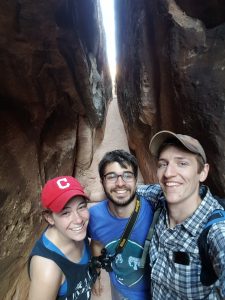 Name: Carter Palmer (pictured right)
Name: Carter Palmer (pictured right)
Hometown: Denver, CO
Lab: Dr. Jerold Chun
Lab website: http://labs.sbpdiscovery.org/
What do you study?
There are almost as many cells in your brain as there are stars in the milky way galaxy! Some of these cells have very different functions; some make memories, some help you think, and some keep you happy and healthy. I look at 10,000 cells at a time and study what they were doing when a person died and I try to understand how these cells change, grow old, and behave, in different brains.
Why is it important?
Your brain is everything! It has been very difficult for scientists to make medicines that treat the brain when it stops working well because we don’t understand everything about it. Hopefully, by understanding the cells in our brain, and how they function, we can start to better understand how the brain works and what goes wrong when it stops working.
What piqued your interest in science?
I went to college to become a biomedical engineer because I loved building things that could help people. When I realized it was difficult to build things to fix the brain, because we didn’t understand it well enough, I started to become fascinated with trying to understand it better.
What do you like about being a scientist?
When I am hiking, I sometimes wonder if I am the first person to ever stand in that exact spot, am I seeing something nobody has ever seen before? Almost always I assume the answer to that question is no, because so much of our world has been walked across. But, when I make a scientific discovery, when I observe something new about the human brain, I am almost certain I am the first person to observe it. That sense of discovery, and the hope that what I am discovering may one day help others, is what being a scientist is all about to me.
What are 5 general vocabulary terms someone should know going into your field of science?
Cell, Neuron, gene, DNA, sequencing
What are 5 specific vocabulary terms someone should know about your research?
Transcriptomic, trisomy, microglia, dendritic pruning, quiescent
